Online dating can be tricky – for all sexes. Putting yourself out onto the interweb, representing yourself as best as you can through a couple of photographs and a tiny paragraph, and then waiting for random strangers to “approve” of you is stressful. But hey, the pursuit of love (or sex) is no easy task, or so claimed Lord Byron.
The spectre of the internet is a double-edged sword – while it is easier to swipe right on someone you like than walking up to them at a coffee shop and introducing yourself, the anonymity of the internet also allows a horrific lack of accountability and often strips people of basic decency. Human beings can be much ruder through the safe distance that screens provide than they might have been in person. Take my male friend, for instance – after mutually agreeing on a time and date for a meeting with a Tinder match, he was ghosted. On the eve of the date, he sent her a confirmation text to check whether the date was on. In response, she unmatched him, and he never heard from her again.
However, being a woman on online dating apps exposes you to specific and targeted online misogyny that far exceeds mere impoliteness. Instagram accounts like @byefelipe and @feminist_tinder (now deactivated) that are based in the US/Australia have been documenting instances of men turning aggressive, abusive and threatening when faced with rejection or disinterest from women on dating apps. I decided to reach out to some Indian women and listen to their experiences of being a woman navigating online dating.
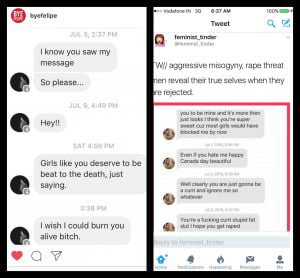
Screen grabs off the Instagram and Twitter pages of @byefelipe and @feminist_tinder, respectively.
Not being a user of online dating apps myself, I tweeted out to women and asked them to share their stories with me. Very quickly, my Direct Messages tab turned into a very dark place. (Please note that all names mentioned here have been changed in the interest of anonymity.)
Doing a story on #misogyny Indian women face on #dating apps like #Tinder, esp after rejecting a guy. Pls DM me if you've faced this? RT!
— Asmita (@asmitaghosh18) November 10, 2016
The commonest behaviour that women reported to finding irksome was persistence. Men would keep sending them messages, even if the women did not reply. If the women left-swiped or unmatched (on Tinder), the men often sought them out on Facebook and messaged them there – even though left-swiping or unmatching is an obvious sign of disinterest.
While the incessant messages border on the annoying, they can quickly turn creepy and end up limiting women’s engagement with public spaces, as in the case of Latika*, who noted that a man from Tinder found her on Facebook and started ‘liking’ all public events that she had clicked ‘interested’ or ‘going to’ on – even though she had not swiped right on his Tinder profile or accepted his friend request on Facebook. This made her so uncomfortable that she did not go to those events in the fear that he might show up there to meet her.
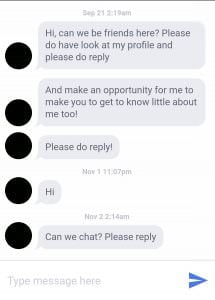
Messages of this sort exist in almost every woman’s ‘Other’ folder on Facebook. Persistence among men is symptomatic of a larger problem of male entitlement.
Persistent messages can soon give way to abusive, misogynistic ones when men are faced with rejection. Priyal* recounted that once, she was not next to her phone for some time, and started receiving abusive messages from two men for swiping right and not replying to them. These messages included words like “pricey”, “didn’t want to swipe right anyway”, “fucking bitch”, and “slut.” Vanessa* wrote in about one man that she had initially had a great conversation with, but later lost interest in when he began to pester her for nude pictures that she did not wish to share. Although she has since deleted the app due to the overall bad experience she faced with online dating, she remembered his retort word for word because of its sheer viciousness. He wrote, “I wouldn’t fuck you with a ten foot pole, you fat feminazi cunt. You look like you have a fishy vagina anyway.” Afreen* reported a similar incident, with a man getting defensive and rude when she did not reply promptly, as she was not interested in him. He responded by telling her how she looked like an “old aunty” and had only swiped right because he had felt sorry for her.
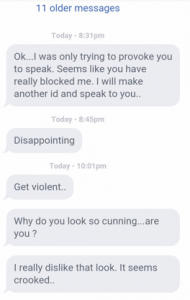
This man later replied saying, ” Bahadur, why no speak?” because the woman in question was Nepalese. Boy, racism sure gets those panties dropping!
This sentiment of men getting defensive and angry upon being rejected runs deep – many women wrote in with similar stories to these. Upon rejection, men react with hostility and an overt misogyny, expressing an unbridled anger at being rebuffed. Their first reaction is to shame the woman, usually on their bodies and sexuality, as these are the only attributes that these men seem to value in women.
However, body-shaming does not only occur after rejection. Negging is a classic pick-up strategy used by men to flirt with women. It involves subtly undermining a woman’s self-esteem to make her more receptive to their advances. Priyal* reported to receiving the classic “you’re pretty for a fat girl” neg multiple times. Tulika* received a subtler version – a man she matched with kept giving her apparently well-intentioned advice on how she should pose so that she would photograph better, even though she had not once asked him for his opinion or advice.
Of course, body-shaming quickly turns much more incisive and targeted when the man has been spurned. Nupur* wrote in about a man who started off by asking her if she had a “fat pussy” because he’d “love to bang one”. (Are you listening, men? Because this is the perfect way to pick someone up!) When she reacted with disgust, he went on to say that she should be grateful he has a fat woman fetish because otherwise she was too ugly for any attention to be paid to her. Nupur* of course, unmatched him instantly. A few days later, she matched with another guy and it turned out to be the same man with a fake profile.
Like Nupur*, other women too have borne the brunt of abrupt sexual propositioning – apparently a classic opener in the world of online dating.
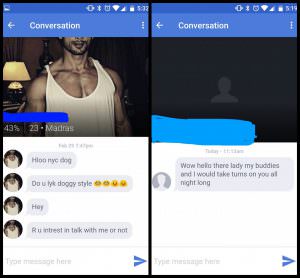
Both these screenshots were submitted by the same woman, showing abrupt sexual propositioning on OKCupid. The second one has no hint of consent in the message, and is practically a gang-rape threat.
Why do men believe that abrupt sexual propositions are a good way to hit on women? This is part of the larger pattern of slut-shaming women on dating websites. Due to the hook-up culture that apps like Tinder are said to promote, there is an inherent notion that women that populate it are ‘easy’ and therefore deserving of overtly sexual, unsolicited language. While being ‘easy’ or desirous of sex is not a negative quality in the slightest, the value judgment that is attached to it by these men and the society at large, is.
When women do not react favourably to explicit messages, they are faced with deep resentment from their matches. “Why did you swipe right if you didn’t want sex?” is a common complaint. Puneeta* writes, “Men expect to get laid immediately. If you resist they come up with responses like, ‘Come on yaar, chill, I know you are not a virgin, I know you have done it before.'” Women are thus covertly or overtly shamed for daring to have a presence on these websites. The message that is put forth is: if you have a Tinder/OKCupid profile, you must be easy, and therefore, you must want to have sex with me. When this narrative is interrupted by women who reject these men, the men do not know how to deal with it, and turn abusive. Puneeta* recounts how, upon rejection, one man asked her to perform sexual acts on her father.
This slut-shaming continues on other mediums. An app called ‘Secret’, which allows your network of friends and friends-of-friends to post anonymous confessional messages, is a hotbed of slut and body-shaming. Female users of the app told me how they saw several instances of women’s bodies and sex lives being publicly discussed on the app under the protection that anonymity granted. Often, these women’s full names and Twitter usernames were given out, so that those that did not know the woman could pass judgment on her for themselves.
Also read: This Indian woman’s blogpost on her experience with online dating
The recurring motif in all of these stories is an inability to accept the word ‘no’. Perhaps the most chilling story I received was that of Shilpi*, who met with a Tinder match on a mutually agreed upon ‘friendly date’, in order to show him around the city as he was new to it. After the date, Shilpi* began to receive multiple messages from this man saying how she was ‘perfect’ for him, and how he wanted to introduce her to his parents. When she told him that she was not interested in him, he began to hound her, sending her incessant messages. He added her friends and associates from Facebook and LinkedIn in a bid to get close to her. He began to physically stalk her, finding her home address and places that she frequented and sending her threatening messages, even going so far as telling her that ‘she was going to wish she were dead’ for doing this to him. The harassment got so bad that Shilpi* ended up having to quit her job, move cities, and also remove all trace of herself from all social media to get away from this man.
What is the common theme underlying all of these interactions – ranging from the garden-variety Facebook friend-requests from physical stalking, harassment and abuse? The mentality of male entitlement. Male entitlement is the belief that men are owed sex by virtue of their maleness. Male entitlement manifests itself in both overt and covert ways – the persistent friend requests and messages, for instance, stem from this mentality – if one tries hard enough and sends enough friend requests, then the woman in question must reciprocate! It is thus difficult for these men to grasp the concept of disinterest.
This is essentially the basis of rape culture – upholding the notion that a woman’s consent does not matter.
Women’s consent and their choices are devalued and attacked if they do not conform to men’s expectations.
Also Read: Lines of Consent: “Only Yes means Yes,” If Society Says So
The aggression and abuse in the examples above are more overt examples of male entitlement. In the words of one of my respondents, ‘the men come at you with their hackles raised’.
Being faced with total and unwavering refusal, these men are humiliated – their maleness is rendered suspect, because patriarchy teaches men that masculinity is synonymous with female sexual interest and consent.
When this ‘truth’ does not manifest itself, they lapse into misogynistic abuse – insulting women for their very womanness, because it must be their ‘womanness’ that is suspect instead.
Online dating thus, is fraught with the same misogyny that is present in other facets of ‘real life’. In fact, the anonymity that the internet provides allows sexism to flower even more freely, as the rules of human decency and communication are allowed to wither by the sterile light of a phone screen. The apps themselves offer some level of protection, in terms of features that allow one to ‘report abuse’ or ‘block’ abusive profiles. However, they cannot control the communication that occurs between two people, or the spillover to Facebook where harassment can continue.
Women are often pushed to deleting these apps because they are unhappy with the misogyny they have to endure. Many of my respondents thus, did not have screenshots to send me because they had deleted the app. Again, we see that it is women’s experiences with the online dating world that are curtailed, instead of the harassers being sent away.
My respondents also told me that the experience has not been all bad, with several women talking about the positive relationships that they have formed as a result of meeting on apps like Tinder. As Tulika* said, “I have met some very nice guys who I now call friends. It can be a toss-up. Just like life!” However, we must be aware of how the internet, just like the real world, is a specifically gendered experience, where women face the same sexist entitlement and harassment that they otherwise face in their daily lives.
*All names mentioned have been changed to protect privacy.
Featured Image Credit: Shameless Magazine
About the author(s)
Asmita is a Freelance Communications Consultant, and specialises in leading digital advocacy campaigns for social and gender justice issues. When not using social media for work, she uses social media for fun (and a healthy dash of existential despair).

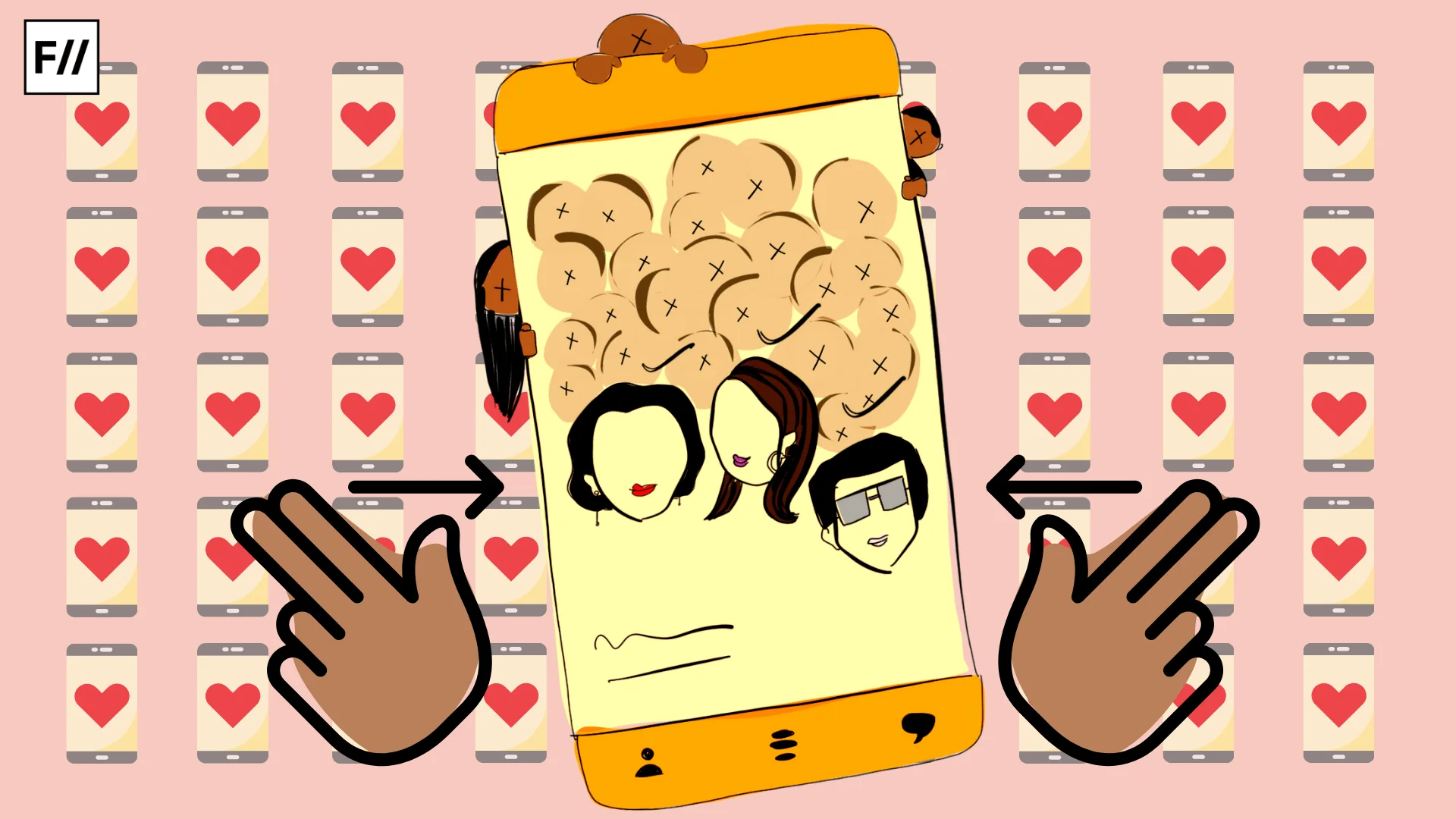



Tried Tinder for almost a month but did not get any date. After trying and testing a few apps, I finally settled on houston.partyline.com chat site for busy people ( my friend claim so ). So far so good and I’m happy with it.
Its sad and shameful.
Here’s my article on OKCupid profiting off misogynist harassment, which appears to be their main source of income:
http://okcupidprofitsoffmisogyny.blogspot.com/
Your post is wonderful. The truth is, the majority of men on dating websites and apps are misogynists, period. This ties in to the abnormally high amount of comments from men viciously bashing single women anytime someone writes an article about online dating, as well as studies done by OK Cupid that show that their male users only want “the most beautiful” women, as well as “young” women. Emotionally healthy single men with fulfilling lives do not use dating platforms. My experiences confirmed this many times over.
Very likely, men on dating apps/websites experienced some form of abuse or neglect growing up. They have no friends or hobbies. If they have jobs, they do not like them or gain any fulfillment from them. They are the epitome of inhuman, devoid of emotional connection and happiness. No one wants to get remotely close to them, so they live what could be described as a parody of a social life on the internet. This includes dating apps/websites.
These pitiful animals refuse to look to themselves or to acknowledge their own feelings and issues. They have an inability to do so. They are not suitable for human relations or procreation. Due to the toxicity of the hatred they steep themselves in, they are likely to suffer from poor health in middle age, and not likely to live long at all. They will die as they have lived: alone, unloved and helpless.
Any self-respecting woman should quit dating websites and apps immediately. Joining them makes a woman nothing more than a target for misogynists. Remember, these men cannot get dates in the real world. They must use dating websites/apps. Cutting those platforms out means cutting out misogynists.
Interestingly enough, as a single parent, I didn’t receive the level of misogynistic behavior that this post reveals. It’s not surprising, however, when one considers the misogynist’s attitude towards single mothers. They hate us, so they avoid us. Still, I do not recommend dating apps/websites for single mothers.
A fact often buried in modern society’s push for online dating to be accepted is that most online dating users are males. Popularizing online dating is the same as popularizing misogyny.
That’s sick of those guys. Absolute perverts, life is simple why complicate it this way. These sites are allowing you to meet people, know them, if you are like minded take it further else be OK with it.